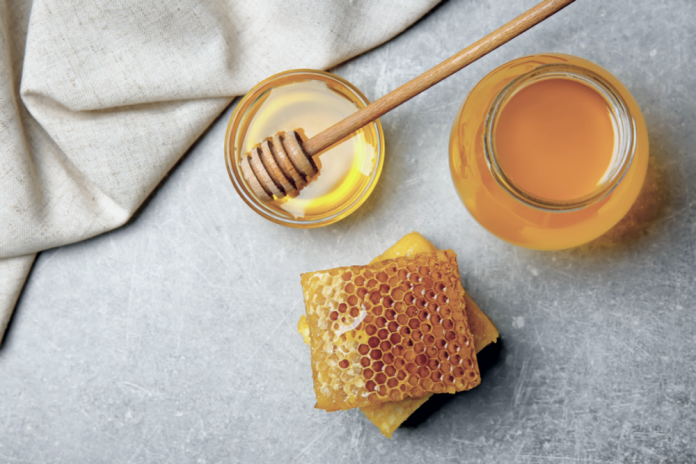Honey can be portrayed as liquid gold that seems to stand above the rest of other sweeteners. While added sugars are recommended to be kept to a minimum in the diet, is honey really the bee’s knees or are all sweeteners on the same nutrition level?
Discover the top research-backed health benefits of honey along with other considerations for adding honey to your diet.
Honey Nutrition Facts
A tablespoon of honey provides the following:
- 60 calories
- 0 grams (g) fat, cholesterol, sodium, and protein
- 17 g carbohydrates, 6% Daily Value (DV)
- 17 g sugar
Similar to other sweeteners, honey’s calories all come from sugar. However, a unique characteristic of honey is it is actually sweeter than other sugars on a weight basis.
While this may sound like a bad thing, it actually means less honey is needed to get the desired sweetness level for drinks, baked goods, etc. compared to other sweeteners.
What Is the Healthiest Type of Honey?
According to the Cleveland Clinic, there are more than 300 types of honey in the US depending on what flowers were used to produce the honey.
The types of honey are generally categorized into light or dark honey. For example, acacia and clover honey are considered light types of honey, and buckwheat or manuka honey are examples of dark honey.
While the calorie and sugar content will not differ significantly, darker honey varieties can be higher in antioxidants and other trace nutrients.
Another consideration for the healthiest type of honey is if it is raw or pasteurized. Raw honey is simply removed from honeycombs and poured through a strainer to remove inedible parts.
Pasteurized honey is heated up and filtered which helps extend the shelf life of honey and further removes any impurities. While there is some debate over nutritional differences between raw and processed honey, the National Honey Board suggests heating honey does not change the nutritional composition.
However, if commercially processed honey is ultra-filtered for a smoother consistency, beneficial enzymes, small amounts of pollen, antioxidants, and other nutrients could be filtered out. This is why some experts suggest raw honey is the healthiest type of honey.
What may impact the nutritional composition of honey is its purity. Some honey found in grocery stores may have corn syrup or other sweeteners added to honey. Be sure to check labels for 100 percent honey and if possible, buy from local suppliers to ensure purity.
5 Sweet Health Benefits of Honey
Does honey really have sweet health benefits? The following benefits are research-backed and justify why honey may be the sweetest and healthiest of them all.
However, that does not give a green light to slather honey on everything. It should still be used in moderation, as it is a source of added sugar.
Cough Suppressant
Coughs can have a range of root causes. But honey has been shown to be just as or even better in cough relief at night in children, according to a 2007 study.
In fact, the American Academy of Pediatrics and the World Health Organization also support honey as a potential treatment for a cough. Keep in mind, though, honey is not considered safe for infants under one year.
Source of Antioxidants
One of the main drawbacks of sweeteners is they provide little to no nutritional value outside of providing a source of quick digesting sugar. An exception to this rule is honey, as honey has been shown to be a source of antioxidants that are absorbable by humans.
How much antioxidants honey provides can vary. The amount and type of antioxidants depend largely upon the honey’s floral source and/or variety of the honey.
In general, the darker the honey, the higher the potential for antioxidant amount.
Bone Building Benefit
When thinking of bone-building foods, honey probably does not come to mind. However, some research studies with rats have shown honey may have a bone-building benefit.
When honey was supplemented along with calcium supplements, calcium absorption was significantly increased. Other rat research found supplementing honey increased bone density in rats over 52 weeks compared with a placebo group.
While more human research is needed on this potential honey benefit, these animal studies suggest honey may positively affect bone health.
Antibacterial and Anti-inflammatory Properties
Inflammation and bacterial infection can go hand in hand, and honey can help fight off both of these things. In-vitro studies have shown honey has antibacterial properties. In fact, some research has shown honey has bacteria-fighting properties for strains of bacteria that are resistant to antibiotics.
The antioxidant properties of honey also provide an anti-inflammatory benefit. Some research has shown Manuka honey to specifically decrease the inflammatory response associated with ulcerative colitis.
The extent of antibacterial and anti-inflammatory properties in honey can vary. Different floral sources, locations, bee species, storage (time and temperature), and processing can all impact these health benefits.
Remember, while these benefits hold promise for potential medical treatment, taking honey for antibacterial or anti-inflammatory benefits should not be done in place of medications.
Beneficial for Wound Healing
Besides the health benefits of ingesting honey, there are benefits of applying honey to wounds (under medical supervision only).
For example, some studies have found honey can heal partial thickness burns more quickly than conventional dressings. Post-operative infected wounds may even be treated by honey more effectively if using antiseptic or gauze. Some clinical settings have also shown honey can help heal ulcers.
How Much Honey Should You Eat?
Even though honey provides some additional health benefits that other sweeteners do not have, it should still be consumed in moderation. Instead of adding honey to everything, use it in place of other sweeteners like table sugar. Honey can be used to sweeten plain yogurt, oatmeal, drinks, marinades, dressings, and baked goods.
The American Heart Association recommends limiting total added sugars, including honey, to 6 teaspoons (25 grams of sugar) a day for women. Men are advised to limit to 9 teaspoons (36 grams of sugar) a day for men.
Honey Health Benefits Summary
While honey does have research-backed health benefits, it is still considered a source of added sugar that should be limited in the diet. There are many types of honey, depending on the flower sources used, but the nutritional profile is not significantly different between varieties.
Raw honey is not as processed as pasteurized honey and, therefore, may contain higher amounts of antioxidants, bee pollen, and other micronutrients. Some commercially made honey may be mixed with other sweeteners, like corn syrup, which can affect purity and nutrition. Be sure to check labels and sourcing honey products.
Health benefits of honey may include acting as a cough suppressant for children, being a source of antioxidants that provide anti-inflammatory and antibacterial properties, aiding in wound healing, and even helping build strong bones.
References:
Natural & Wholesome. National Honey Board. https://honey.com/nutrition/natural-wholesome.
Scepankova H., Saraiva J.A., Estevinho L.M. Honey Health Benefits and Uses in Medicine. In: Alvarez-Suarez J. (eds) Bee Products – Chemical and Biological Properties. Springer, Cham. Published June 2017. https://doi.org/10.1007/978-3-319-59689-1_4.







